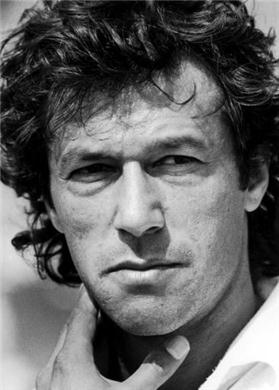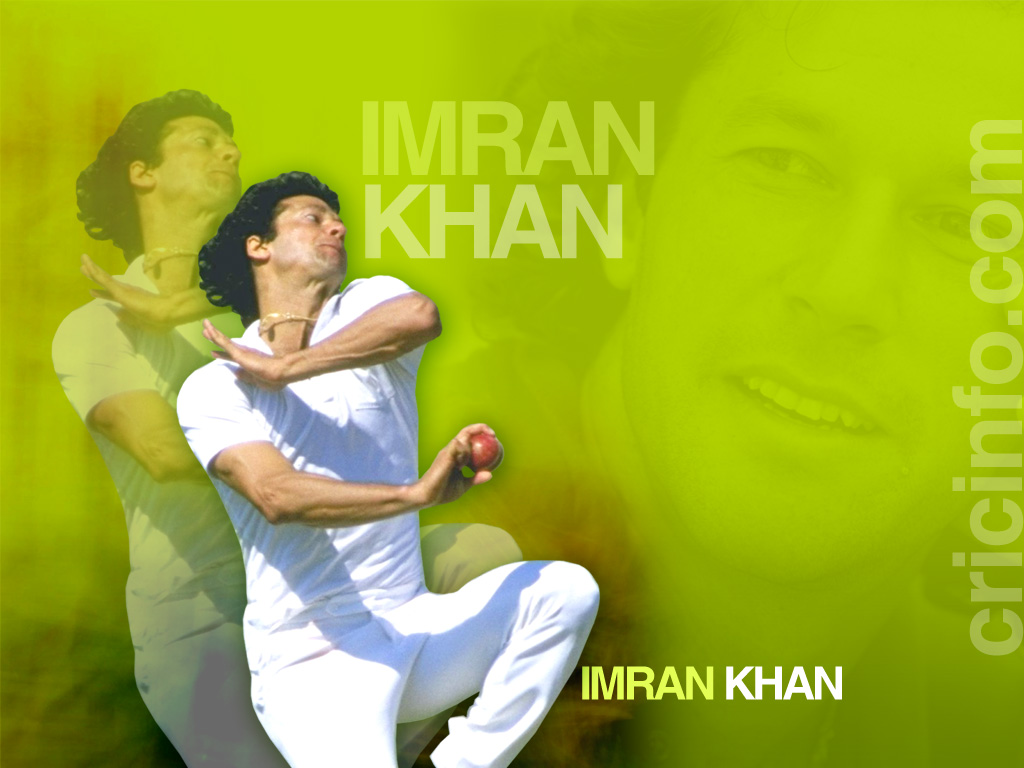Imran
attended Aitcheson College and the Cathedral School in Lahore until he finished
middle school, then entered the Royal Grammar School, Worcester, before
completing his formal schooling with an undergraduate degree in Economics from
Keble College, Oxford.
While at
University, Imran Khan was also the captain of the Oxford University cricket
team in 1974. He and his mother, Shaukat Khanum, come from a cricketing family
– the Burkis, with two of his cousins, Javed Burki and Majid Khan, also having
played Test cricket for Pakistan.
He is the
finest cricketer Pakistan has ever produced, who is among the finest
all-rounders and greatest fast bowlers the game has ever seen. He played Test
cricket for Pakistan between 1971 and 1992, and was captain of the national
team when they won their maiden World Cup in 1992.
After
retiring from cricket, Imran Khan founded the Shaukat Khanum Memorial Cancer
Hospital & Research Centre in Lahore.
In 1997,
he started a socio-political movement known as the Pakistan Tehrik-e-Insaf
(Movement for Justice). The main focus of his party is to bring justice to the
people of Pakistan, largely via an independent judiciary. The party has Islamic
overtones and is inspired partly by Imran Khan’s renewed commitment to Islam.
As a
politician, his vision is to turn Pakistan into a just society, based on humane
values, by creating an independent and honest judiciary that will uphold
democracy, protect human rights and ensure the rule of law and, by promoting a
merit based system that provides equal opportunity for upward social mobility
to the working classes. His political ideal is the famous poet-philosopher,
Allama Dr Muhammad Iqbal.
Talking to
Daily Telegraph of England about his political goal, Imran Khan said: “I want
Pakistan to be a welfare state and a genuine democracy with a rule of law and
an independent judiciary. We need decentralisation, empowering people at the
grassroots.”
He became
a Member of Parliament for Mianwali in the October 2002 elections. He is very
critical of the judicial system in Pakistan, which he says prevents
accountability for the elite class. Initially he supported 1999 military coup
of General Pervez Musharraf but late came in to the forefront against General
Musharraf.
In 2005,
as leader of his party Imran led a protest rally against the US-led coalition
for allegedly desecrating the Holy Quran and made statements denouncing the
Musharraf-Bush coalition. During the visit of US President George W Bush to
Pakistan in 2006, he was the only politician to attempt to hold a rally against
Bush. The rally was stopped and Imran Khan was detained by the police.
Imran Khan
is also a special representative of UNICEF and Chancellor of Bradford
University. His honours include Hilal-i-Imtiaz (Crescent of Excellence) in 1993
by the Pakistani government; Honorary Fellow of Keble College, Oxford and
Wisden Cricketer of the Year 1983.
In 1995 he
married Jemima Khan, the daughter of the late British billionaire Sir James
Goldsmith. Jemima Khan embraced Islam before she married Khan. They announced
their divorce on June 22, 2004. They have two sons named Suleman Khan (born on
November 10, 1999) and Qasim Khan. He is alleged to have a daughter out of
wedlock with Sita White, daughter of Lord Gordy White, a few years before he
married Jemima Goldsmith. A US judge ruled him to be the father of Tyrian White
after he failed to appear for a DNA test.
Although
there are little achievements to credit of Imran Khan in the political arena,
there is a long list of his achievements in the sport of cricket. He has the
third highest best-ever bowling rating of 922 (1983) in Test cricket history
behind S F Barnes’s 932 (1914) and G A Lohmann’s 931 (1896).
Imran Khan
is pioneer of the art of reverse swing. He was one of the fastest bowlers ever
to grace the game. Michael Holding, the great West Indian fast bowler and
commentator, when asked in an interview with Cricinfo who the best bowlers he
came up against were, said: “In my time, it was Dennis Lillee and Imran Khan.
They had pace and they could do things with the ball. You had others who got a
lot of wickets, but you wouldn’t say that they were fast. Imran … could
intimidate people out with his pace and also get them with movement, especially
into the right-hander.”
In the
cricket world, Imran Khan is renowned for his leadership skills as a captain.
Under his captaincy, Pakistan won the 1992 Cricket World Cup. Under his
captaincy Pakistan drew three series with West Indies at a time when everybody
else was being whitewashed by West Indies. He always led from the front and
five of six Test hundreds and 14 of his 18 fifties came in 48 Tests as captain.
His average during that time was 52.34, higher than the averages of Ian
Chappell, Clive Lloyd, Steve Waugh, Gavaskar and Javed Miandad. Imran averaged
20.26 with the ball and four of his six 10-wicket hauls came as captain.
As a
captain, he transformed the Pakistan team, previously known for its exceptional
talent but lack of coherence into a well-moulded unit. He played his last Test
match for Pakistan in January 1992 against Sri Lanka at Faisalabad and last ODI
being the World Cup final against England at Melbourne in March 1992 resulting
in the World Cup glory and triumph for Pakistan.
In 2000,
Wisden organised a panel to vote for Wisden Cricketers of the Century who were
judged to be the most prominent players of the 20th century, as selected by a
100-member panel of cricket experts appointed by Wisden Cricketers’ Almanac in
2000. In order of votes, the Wisden Cricketers of the Century, Imran Khan was
number 10 on the list.
Along with
Garfield Sobers, Ian Botham, Kapil Dev and Richard Hadlee, he achieved the
‘All-rounder’s triple’ (3000 runs and 300 wickets) in 75 Tests, the second
fewest behind Botham’s 72, though statistically and qualitatively Imran Khan is
superior to Botham in every aspect of the game except perhaps slip catching. He
was one of the fastest bowlers of the world during the late 1970s and early
1980s, and in the later half of his career, one of the best batsmen in the
Pakistan cricket team. He has the second highest average of all time for a Test
batsman batting at number 6.
In April
2007, Imran Khan was voted as the greatest all-rounder in a readers’ poll by
Cricinfo. He received 37 per cent of the votes, beating Sir Garfield Sobers who
was second with 14 per cent out of the 20 all-rounders Cricinfo had selected.
Incidentally Cricinfo panel chose Sobers as the greatest all-rounder
independent of the poll. According to the panel, Imran Khan was Sobers’ closest
rival amongst the quartet of great all-rounders (Imran, Botham, Hadlee, Kapil).
After
retiring from cricket, Imran Khan founded the state-of-the-art Shaukat Khanum
Memorial Cancer Hospital and Research Centre in Lahore on December 29, 1994.
One of the leading institutions for free cancer treatment in the world, it is
an international standard institution and is free for poor people. The World
Health Organisation awarded the United Arab Emirates Foundation Prize for 2004
to Shaukat Khanum Memorial Cancer Hospital. He is building another cancer
hospital in Karachi.
Imran Khan
is also the Chairman of the Mianwali Development Trust, which is building the
Namal College in Mianwali as an associate college of Bradford University. The
first phase of the college buildings has been completed.
Imran
Khan, perhaps first Pakistani, is the Chancellor of the University of Bradford
since December 7, 2005. He said the fifth Chancellor of the university and is
also a patron of the Born in Bradford research project.
After
imposition of the state of emergency by General Musharraf on November 3, 2007,
Imran Khan was put under house arrest but his succeeded in slipping away.
However, he was arrested from the University of Punjab campus in Lahore a few
days later with help of the Islami Jamiat-e-Talba, student wing of
Jamaat-e-Islami. On November 19, 2007, he let out the word through his party
members and family that he had begun a hunger strike. He was one of the 3,000
political prisoners released from imprisonment on November 21, 2007.
In 1976
and 1980, Imran Khan was awarded the Cricket Society Wetherall Award. He was
awarded the Lifetime Achievement Award at the 2004 Asian Jewel Awards in
London, UK.
IMRAN KHAN


Imran Khan
Imran Khan
Imran Khan

Imran Khan
Imran Khan
Imran Khan
Imran Khan
Imran Khan
Imran Khan
Imran Khan



.jpg)
_cropped.jpg/190px-Konferenz_Pakistan_und_der_Westen_-_Imran_Khan_(4155877864)_cropped.jpg)





.jpg)


No comments:
Post a Comment